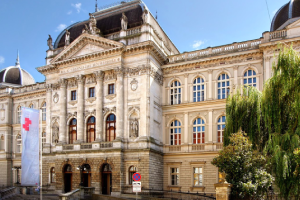Rechbauerstraße 12, 8010 Graz, Austria
Career Counselling

Graz University of Technology is located in the centre of Graz, the second largest city in Austria. With almost 14,000 students, of whom a quarter are from outside Austria, it is a cosmopolitan and diverse University. It is a notable centre of excellence in Architecture, Mechanical and Civil Engineering.
Academic and research activities at Graz University of Technology are divided into 7 Faculties (Architecture, Civil Engineering, Electrical and Information Engineering, Computer Science and Biomedical Engineering, Mechanical Engineering and Economic S...
| Establishment year | 1811 |
| Total Students | 13,712 |
| International Students | 3,318 |
| QS World University Rankings 2024 | =421 |
| Campus Size | N/A |
| Total Number of Campuses | 3 |
| University Website | https://www.tugraz.at/en/home/ |
| No. of Schools and Divisions | 7 Faculties and 97 Institutes |
| Nobel Prize Winner Alumni | 0 |
| No. of Education Programs | 19 (undergraduate), 35 (Master’s), 14 (PhD), 9 (other postgraduate) |
| Student to Faculty ratio | 7:1 |
Graz University of Technology offers undergraduate and postgraduate courses through 7 Faculties, which are further subdivided into 97 Institutes.
Applicants to Undergraduate Programmes at TU Graz must satisfy the following requirements:
Applicants to Master’s Programmes at the University must satisfy similar eligibility criteria, with the difference that degree certificates and transcripts from a recognised undergraduate course must be submitted. In addition, certain PG courses are taught in English, and applicants to these courses must prove their proficiency in the English language, with a TOEFL score of at least 95, or an IELTS score of 7 points or higher.
Applicants to Doctoral Programmes at TU Graz must first decide on a thesis subject and a supervisor, and enclose a letter from their chosen research guide certifying that they are willing to supervise their research work at the University.
All international applicants to TU Graz must complete the following steps:
All students of the University - both domestic and international - must pay the Student Union fee of 21.20 Euros per semester (or 42.40 Euros per year); this amount is fixed by the Austrian Government.
International students who are not from the European Union (both undergraduates and postgraduates) pay tuition fees of 726.72 Euros per semester. Domestic students from the EU do not have to pay tuition fees for the expected duration of their course + two semesters; after this period, they must pay fees of 363,36 Euros per semester. Students can apply for tuition fee waivers in the following cases:
Living costs for students at TU Graz are usually a little less than 1,000 Euros per month. The University estimates that the minimum monthly budget is about 600 Euros, of which half goes towards accommodation, and the rest towards food, transport, phone, and shopping for personal items. Prices for a room in the various student residences in the city of Graz are between 150 and 400 Euros per month.

Graz University of Technology has three campuses in the city of Graz. The Alte Technik campus is the oldest extant location, and was built about 70 years after the establishment of TU Graz, when the original Leslies of Building was no longer sufficient. It contains the Main Library and buildings for architecture and civil engineering. The Neue Technik campus is about a century old, and was initially created to accommodate new professors and students in natural sciences and mechanical engineering. This location is constantly expanding, with the new Biomedical Engineering building being a recent highlight. The Inffeldgasse Campus is more than 50 years old, and houses several electrical engineering buildings and high voltage laboratories. It is home to many cutting edge research centres across Faculties. The city of Graz is very student friendly, with almost 20% of the residents studying at various Universities.
The TU Graz Student Union coordinates the activities of several student clubs and provides helpful information to different members of the University community. It also gives students access to bulk discounts. Some of these are cultural, with the Kulturpass allowing members of the University community to attend art and film events in the city for free or at a highly reduced cost. It also allows students to access the Mensa Canteen and avail a discount of almost 1 Euro per meal, which adds up to over 300 Euros per semester.
The University Sports Institute at TU Graz maintains all the sporting facilities and conducts training programmes for new students. Regular courses in sports as diverse as beach volleyball and archery are held, and the Sports Centre is open for 15 hours a day, 6 days a week. This hosts both indoor sports halls and outdoor fields, so that athletes of all types can pursue their health and fitness goals.

There are several cultural student clubs at TU Graz. The University Orchestra is a joint venture between the University of Graz and Graz University of Technology; it regularly performs at important events in the University and city.
The University Choir sees the same two Universities come together, along with a third collaborator (the Medical University of Graz). The main event of the annual cultural calendar at the University is the Grand Ball, where all students come together for an evening of recreation and performances.
There are also multiple student clubs dedicated to exploring the area in and around the city of Graz, including mountains, lakes, and natural beauty.
Regular hiking trips and adventure tours are organised by these student bodies.
The flagship scholarship program at the University (for domestic and international students, undergraduates and postgraduates) is TU Graz 100. This supports Bachelor’s students with an amount of 4,000 Euros, and Master’s students with up to 8,000 Euros. Up to 100 students can be awarded this scholarship, and several companies sponsor these seats partially. For example, Siemens, Huawei, and Energie Steiermark provide scholarships to Bachelor’s students within the TU Graz 100 umbrella. ATCOLD, REMUS, and AVL sponsor scholarships for Master’s students.
Current students of TU Graz who have consistently excellent academic results can apply to their respective Dean’s Office for Merit Scholarships. The amount attached to these scholarships ranges from 750 to 1,500 Euros per year.
Master’s and Doctoral students can apply for Thesis Scholarships during the writing phase of their research degrees. The annual scholarship amount is between 750 and 3,600 Euros. Research students can also apply for University Grants to enable them to study abroad for a semester or attend international conferences.
The scholarship with the highest award amount is the Best of South East Scholarship, sponsored by Steiermärkische Sparkasse. Students from South-Eastern Europe can apply (countries: Slovenia, Bosnia and Herzegovina, Croatia, Serbia, Montenegro and Macedonia) and are selected based on academic achievement. The award amount is 750 Euros per month for a year, in addition to a two month summer internship.
Certain Institutes and Faculties have exclusive financial aid options for their students. For example, the Information Security Scholarship for Master's students in Computer Science gives incoming students an award of 4,000 Euros per year based on their talent and motivation.
